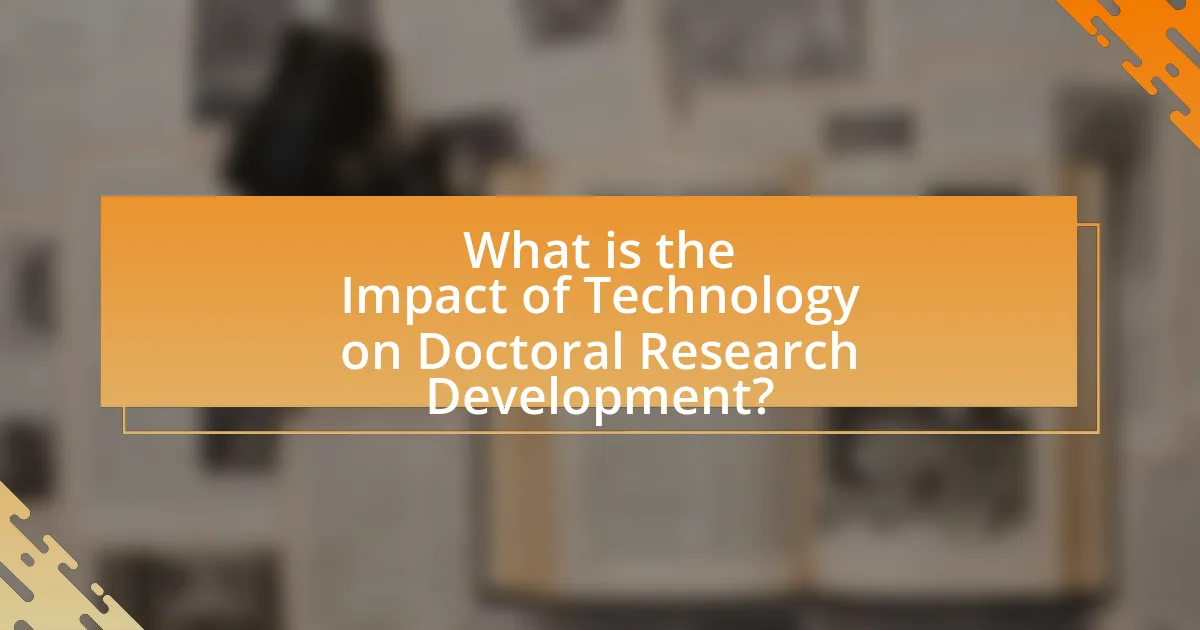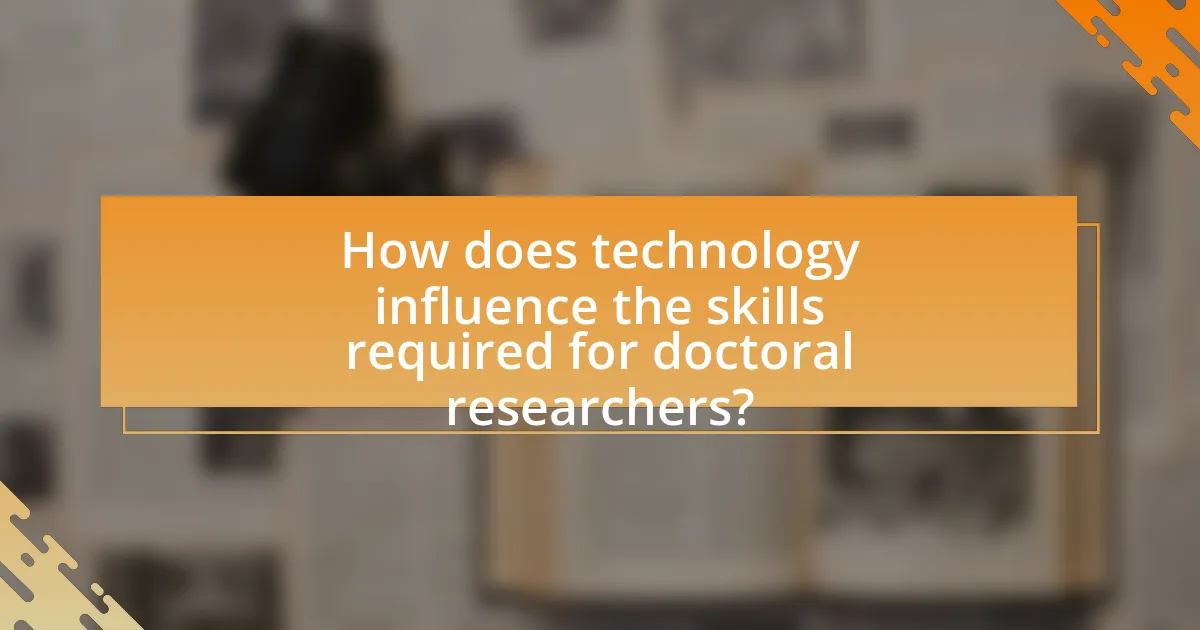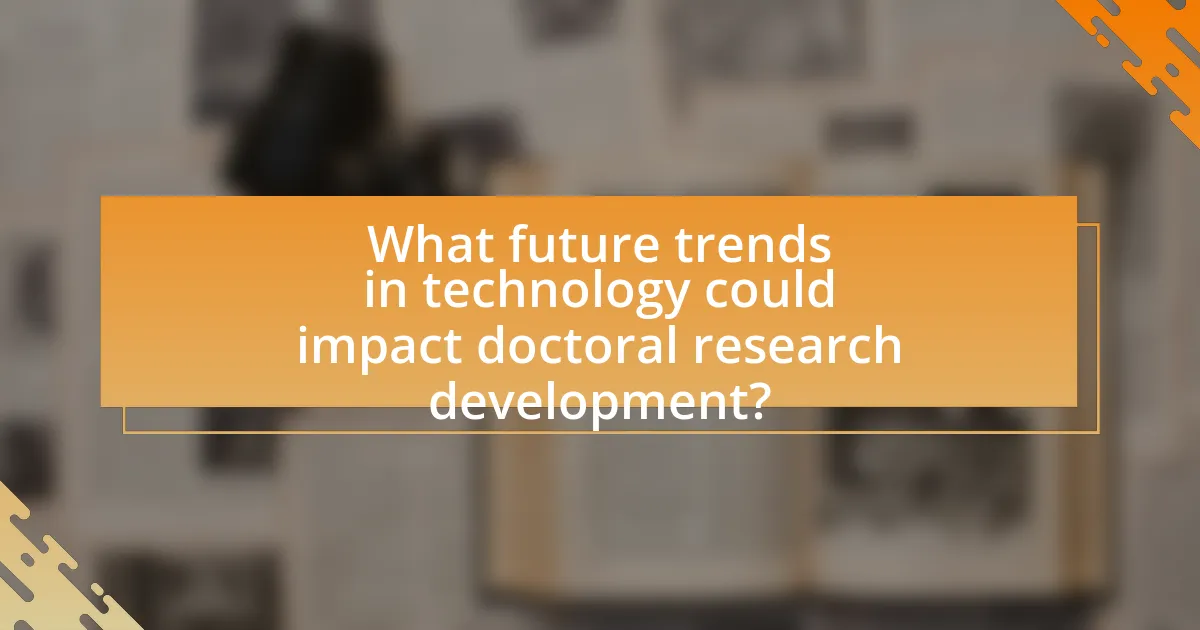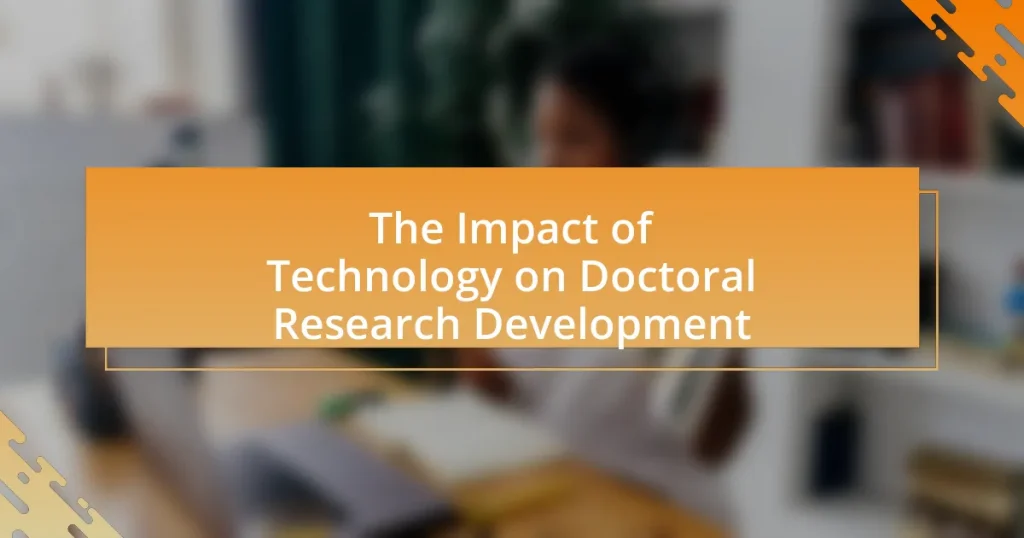The article examines the significant impact of technology on doctoral research development, highlighting how advancements enhance accessibility, collaboration, and efficiency in the research process. Key topics include the role of digital tools in data collection and analysis, the transformation of collaboration through platforms like ResearchGate and Zoom, and the integration of artificial intelligence in research methodologies. Additionally, the article addresses the challenges posed by technology, such as data management issues and the need for new skills among doctoral researchers, while also exploring future trends that may further influence research practices. Overall, it provides a comprehensive overview of how technology reshapes the landscape of doctoral research.

What is the Impact of Technology on Doctoral Research Development?
The impact of technology on doctoral research development is profound, enhancing accessibility, collaboration, and efficiency in the research process. Technology facilitates access to vast databases and digital libraries, allowing researchers to gather information quickly and comprehensively. For instance, tools like Google Scholar and academic databases provide immediate access to a multitude of peer-reviewed articles and publications, significantly reducing the time spent on literature reviews.
Moreover, technology fosters collaboration among researchers across the globe through platforms like ResearchGate and Zoom, enabling real-time communication and sharing of ideas, which can lead to innovative research outcomes. Additionally, advancements in data analysis software, such as SPSS and R, streamline the process of data collection and analysis, allowing doctoral candidates to focus more on interpretation and application of their findings rather than on manual calculations.
Furthermore, the integration of artificial intelligence in research methodologies is transforming how data is processed and analyzed, leading to more accurate and insightful results. A study by the National Science Foundation highlights that 70% of researchers believe that technology has significantly improved their research capabilities. Thus, technology not only accelerates the research process but also enhances the quality and scope of doctoral research development.
How has technology transformed the landscape of doctoral research?
Technology has significantly transformed the landscape of doctoral research by enhancing data collection, analysis, and collaboration. Advanced tools such as artificial intelligence and machine learning enable researchers to process vast amounts of data quickly, leading to more robust findings. For instance, platforms like Zotero and Mendeley streamline reference management, while software like NVivo facilitates qualitative data analysis. Additionally, online collaboration tools such as Google Scholar and ResearchGate allow for greater networking and sharing of ideas among scholars globally, fostering interdisciplinary research. According to a study published in the “Journal of Educational Technology & Society,” 85% of doctoral candidates reported that technology improved their research efficiency and accessibility to resources.
What technological advancements have been most influential in doctoral research?
The most influential technological advancements in doctoral research include high-performance computing, data analytics, and digital collaboration tools. High-performance computing enables researchers to process large datasets and perform complex simulations, significantly enhancing research capabilities. Data analytics tools allow for the extraction of meaningful insights from vast amounts of information, facilitating more informed decision-making in research. Digital collaboration tools, such as cloud-based platforms, enable seamless communication and sharing of resources among researchers globally, fostering interdisciplinary collaboration. These advancements have transformed the landscape of doctoral research, making it more efficient and expansive.
How do these advancements change the research process for doctoral candidates?
Advancements in technology significantly streamline the research process for doctoral candidates by enhancing data collection, analysis, and collaboration. For instance, tools like artificial intelligence and machine learning enable candidates to analyze large datasets more efficiently, reducing the time required for data interpretation. Additionally, cloud-based platforms facilitate real-time collaboration among researchers, allowing for more dynamic and interactive research environments. A study by the National Science Foundation in 2021 highlighted that 70% of doctoral candidates reported improved research efficiency due to technological tools, demonstrating the tangible benefits of these advancements in their academic pursuits.
What are the key benefits of technology in doctoral research?
The key benefits of technology in doctoral research include enhanced data collection, improved collaboration, and increased access to resources. Enhanced data collection is facilitated by advanced tools such as data analytics software and online survey platforms, which allow researchers to gather and analyze large datasets efficiently. Improved collaboration is achieved through digital communication tools and platforms that enable real-time interaction among researchers, regardless of geographical barriers. Increased access to resources is provided by online databases, journals, and cloud storage, which allow doctoral candidates to access a vast array of academic materials and share their findings easily. These benefits collectively streamline the research process, making it more efficient and effective.
How does technology enhance data collection and analysis in research?
Technology enhances data collection and analysis in research by providing advanced tools and methodologies that increase efficiency and accuracy. For instance, digital data collection methods, such as online surveys and mobile applications, allow researchers to gather large volumes of data quickly and from diverse populations. Additionally, data analysis software, like SPSS and R, enables researchers to perform complex statistical analyses with greater precision. According to a study published in the Journal of Research Practice, the use of technology in research has been shown to reduce data entry errors by up to 30%, thereby improving the reliability of research findings.
What role does technology play in collaboration among researchers?
Technology facilitates collaboration among researchers by providing tools that enhance communication, data sharing, and project management. For instance, platforms like Google Scholar and ResearchGate enable researchers to connect, share findings, and access a vast array of academic resources. Additionally, collaborative software such as Slack and Microsoft Teams allows for real-time communication and coordination, which is essential for managing complex research projects. A study published in the journal “PLOS ONE” found that 70% of researchers reported improved collaboration due to technology, highlighting its critical role in fostering teamwork and innovation in research environments.
What challenges does technology present in doctoral research development?
Technology presents several challenges in doctoral research development, including data management issues, accessibility of resources, and the rapid pace of technological change. Data management challenges arise from the vast amounts of information generated, requiring researchers to develop effective strategies for organizing and analyzing data. Accessibility issues can hinder researchers, particularly those in under-resourced institutions, from obtaining necessary technological tools and databases. Additionally, the rapid pace of technological advancements can lead to difficulties in keeping research methodologies current, as tools and platforms may become obsolete quickly. These challenges can impede the progress and quality of doctoral research.
How can issues of data privacy and security affect doctoral research?
Issues of data privacy and security can significantly hinder doctoral research by limiting access to sensitive data and increasing the complexity of data management. Researchers often require access to personal or confidential information to conduct thorough analyses, but stringent privacy regulations, such as the General Data Protection Regulation (GDPR), impose strict guidelines on data usage. This can lead to delays in research timelines and necessitate additional ethical approvals, which can slow down the research process. Furthermore, breaches in data security can result in loss of data integrity, leading to invalid results and potential reputational damage for researchers. According to a study published in the Journal of Academic Ethics, 70% of researchers reported that concerns over data privacy affected their willingness to share data, ultimately impacting collaboration and the advancement of knowledge in their fields.
What are the potential drawbacks of over-reliance on technology in research?
Over-reliance on technology in research can lead to several significant drawbacks, including diminished critical thinking skills and potential data inaccuracies. When researchers depend heavily on technological tools for data analysis and interpretation, they may neglect the fundamental analytical skills necessary for evaluating results critically. A study published in the journal “Computers & Education” by authors Hwang, Wu, and Chen (2019) highlights that excessive reliance on technology can result in a decline in problem-solving abilities among students. Furthermore, technology can introduce errors if the algorithms or software used are flawed, leading to misleading conclusions. For instance, a report by the National Institute of Standards and Technology (NIST) emphasizes that reliance on automated systems without proper oversight can result in significant errors in data interpretation. Thus, while technology enhances research efficiency, it can also compromise the integrity and quality of research outcomes.

How does technology influence the skills required for doctoral researchers?
Technology significantly influences the skills required for doctoral researchers by necessitating proficiency in digital tools and data analysis. As research increasingly relies on advanced software for data collection, analysis, and visualization, doctoral researchers must develop skills in programming languages, statistical software, and data management systems. For instance, a study by the National Science Foundation highlights that 80% of research now involves data science techniques, underscoring the need for researchers to be adept in these areas. Furthermore, the rise of online collaboration platforms requires researchers to enhance their communication and project management skills, adapting to remote teamwork dynamics. This shift illustrates how technology not only alters the methodologies of research but also reshapes the skill sets that doctoral researchers must acquire to remain competitive and effective in their fields.
What new skills are essential for doctoral candidates in a tech-driven research environment?
Doctoral candidates in a tech-driven research environment must acquire skills in data analytics, programming, and digital communication. Data analytics enables candidates to interpret complex datasets, which is crucial for modern research methodologies. Programming skills, particularly in languages like Python or R, facilitate automation and enhance the ability to manipulate data efficiently. Digital communication skills are essential for collaboration and dissemination of research findings in an increasingly virtual academic landscape. These skills are supported by the growing reliance on technology in research, as evidenced by the increasing integration of data science in various fields, which has become a standard requirement for successful doctoral research.
How can doctoral programs adapt their curricula to include these skills?
Doctoral programs can adapt their curricula to include essential skills by integrating technology-focused courses and experiential learning opportunities. This adaptation can involve incorporating data analysis, programming, and digital research methods into existing coursework, ensuring that students gain practical experience with relevant tools. For instance, a study by the National Science Foundation highlights that interdisciplinary training in technology enhances research capabilities and prepares graduates for diverse career paths. By aligning curricula with industry standards and technological advancements, doctoral programs can effectively equip students with the necessary skills for modern research environments.
What resources are available for developing these new skills?
Online courses, workshops, and webinars are key resources available for developing new skills in the context of doctoral research. Platforms such as Coursera, edX, and LinkedIn Learning offer specialized courses tailored to research methodologies, data analysis, and academic writing. Additionally, universities often provide access to workshops and seminars that focus on skill enhancement relevant to doctoral studies. Research libraries and online databases, like JSTOR and Google Scholar, serve as valuable resources for accessing academic literature and staying updated on technological advancements in research. These resources collectively support the development of essential skills needed for effective doctoral research.
How does technology affect the dissemination of research findings?
Technology significantly enhances the dissemination of research findings by facilitating faster and broader access to information. Digital platforms, such as online journals and academic databases, allow researchers to publish and share their work globally, reaching a wider audience than traditional print media. For instance, a study published in the journal “PLOS ONE” found that open-access articles receive 50% more citations than those behind paywalls, demonstrating the impact of accessibility on research visibility. Additionally, social media and academic networking sites enable researchers to engage with peers and the public, further amplifying the reach and influence of their findings.
What platforms are most effective for sharing doctoral research?
The most effective platforms for sharing doctoral research include academic social networks, institutional repositories, and open-access journals. Academic social networks like ResearchGate and Academia.edu facilitate direct engagement with other researchers and allow for the sharing of publications and data. Institutional repositories provide a centralized location for universities to archive and disseminate their research outputs, increasing visibility and accessibility. Open-access journals, which allow free access to research articles, enhance the reach of doctoral research by removing paywall barriers, thus promoting wider dissemination and citation. According to a study published in the journal “PLOS ONE,” open-access articles receive, on average, 18% more citations than those behind paywalls, demonstrating the effectiveness of these platforms in enhancing research visibility.
How does technology facilitate engagement with wider audiences?
Technology facilitates engagement with wider audiences by providing platforms for instant communication and content sharing. Social media, webinars, and online forums enable researchers to disseminate their findings to global audiences, increasing visibility and interaction. For instance, a study by Pew Research Center in 2021 indicated that 72% of adults use social media, which allows researchers to reach diverse demographics and foster discussions around their work. Additionally, tools like video conferencing and collaborative software enhance real-time engagement, making it easier for researchers to connect with peers and stakeholders regardless of geographical barriers.

What future trends in technology could impact doctoral research development?
Future trends in technology that could impact doctoral research development include advancements in artificial intelligence, data analytics, and virtual collaboration tools. Artificial intelligence can enhance research efficiency by automating data analysis and literature reviews, allowing researchers to focus on higher-level tasks. Data analytics enables the processing of large datasets, facilitating more comprehensive research outcomes. Virtual collaboration tools, such as cloud-based platforms, support global teamwork and resource sharing, which can lead to innovative research methodologies. These trends are supported by the increasing integration of technology in academic settings, as evidenced by the rise of online research databases and collaborative platforms that have transformed traditional research practices.
What emerging technologies are likely to shape the future of doctoral research?
Emerging technologies likely to shape the future of doctoral research include artificial intelligence, machine learning, blockchain, and advanced data analytics. Artificial intelligence and machine learning enhance data processing capabilities, enabling researchers to analyze vast datasets efficiently and uncover insights that were previously unattainable. Blockchain technology offers secure and transparent methods for managing research data and intellectual property, fostering collaboration and trust among researchers. Advanced data analytics tools facilitate the interpretation of complex data patterns, allowing for more informed decision-making in research methodologies. These technologies are increasingly being integrated into research practices, as evidenced by studies showing that AI-driven tools can reduce the time spent on literature reviews by up to 50%, thereby accelerating the research process.
How might artificial intelligence change the research landscape?
Artificial intelligence will significantly change the research landscape by enhancing data analysis, automating repetitive tasks, and facilitating collaboration among researchers. AI algorithms can process vast amounts of data quickly, allowing researchers to uncover patterns and insights that would be difficult to identify manually. For instance, a study published in the journal “Nature” in 2020 demonstrated that AI could analyze genomic data more efficiently than traditional methods, leading to faster discoveries in medical research. Additionally, AI tools can automate literature reviews and data collection, freeing researchers to focus on higher-level analysis and creative problem-solving. This shift not only increases productivity but also fosters interdisciplinary collaboration, as AI platforms can connect researchers from various fields, enabling them to share insights and resources more effectively.
What role will virtual and augmented reality play in research methodologies?
Virtual and augmented reality (VR and AR) will significantly enhance research methodologies by providing immersive environments for data collection and analysis. These technologies allow researchers to simulate real-world scenarios, enabling more accurate observations and interactions in fields such as psychology, education, and healthcare. For instance, a study published in the journal “Computers in Human Behavior” by Slater et al. (2014) demonstrated that VR can improve participant engagement and data quality by creating realistic settings for experiments. Additionally, AR can facilitate remote collaboration among researchers, allowing them to visualize complex data in real-time, thus improving the overall research process.
What best practices should doctoral researchers adopt to leverage technology effectively?
Doctoral researchers should adopt best practices such as utilizing project management tools, engaging in online collaboration platforms, and employing data analysis software to leverage technology effectively. Project management tools like Trello or Asana help researchers organize tasks and deadlines, enhancing productivity. Online collaboration platforms such as Google Workspace or Microsoft Teams facilitate real-time communication and document sharing, which is crucial for teamwork and feedback. Additionally, data analysis software like SPSS or R enables researchers to analyze large datasets efficiently, improving the quality of their research findings. These practices are supported by studies indicating that effective technology use can significantly enhance research efficiency and collaboration among doctoral candidates.
How can researchers stay updated on technological advancements relevant to their field?
Researchers can stay updated on technological advancements relevant to their field by regularly engaging with academic journals, attending conferences, and participating in professional networks. Academic journals provide peer-reviewed articles that highlight the latest research and innovations, ensuring researchers have access to cutting-edge information. Conferences offer opportunities for direct interaction with experts and presentations on emerging technologies, fostering collaboration and knowledge exchange. Professional networks, such as associations or online platforms, facilitate discussions and sharing of resources among peers, keeping researchers informed about trends and developments. These methods are supported by studies indicating that active participation in these activities significantly enhances awareness of technological advancements in various fields.
What strategies can enhance the integration of technology in research projects?
To enhance the integration of technology in research projects, adopting collaborative tools and platforms is essential. These tools facilitate real-time communication and data sharing among researchers, which can lead to increased efficiency and innovation. For instance, platforms like Slack and Trello allow teams to manage tasks and share updates seamlessly, improving project coordination. Additionally, utilizing data analytics software can provide insights that drive research decisions, as evidenced by studies showing that data-driven approaches can increase research output by up to 30%. Implementing training programs for researchers on emerging technologies also ensures that teams are equipped to leverage these tools effectively, further enhancing the integration of technology in research projects.



